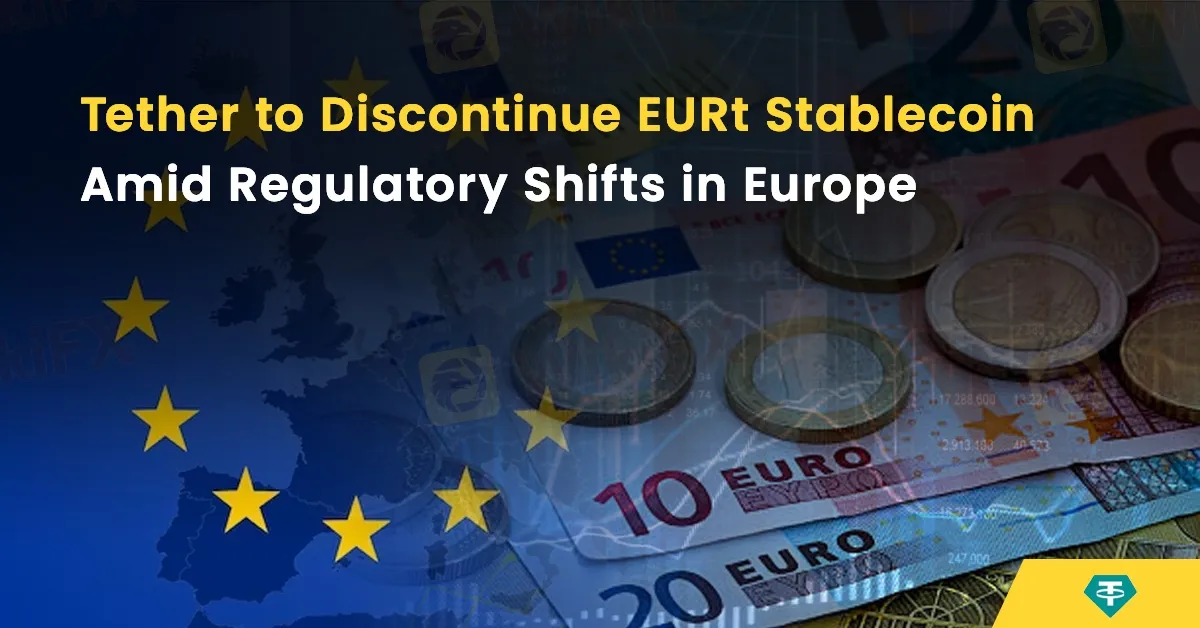简体中文
繁體中文
English
Pусский
日本語
ภาษาไทย
Tiếng Việt
Bahasa Indonesia
Español
हिन्दी
Filippiiniläinen
Français
Deutsch
Português
Türkçe
한국어
العربية
Tether to Discontinue EURt Stablecoin Amid Regulatory Shifts in Europe
Abstract:Tether, the issuer of the world’s largest stablecoin, USDt, has announced that it will cease support for its euro-pegged stablecoin, EURt (EURT), across all blockchains. Users are required to redeem their EURt holdings by 25 November 2025, following the company’s decision to phase out the token.

Tether, the issuer of the world‘s largest stablecoin, USDt, has announced that it will cease support for its euro-pegged stablecoin, EURt (EURT), across all blockchains. Users are required to redeem their EURt holdings by 25 November 2025, following the company’s decision to phase out the token.
The move comes in response to evolving regulatory landscapes in Europe, particularly the forthcoming Markets in Crypto-Assets (MiCA) regulation, which is set to take full effect by the end of 2024. In a statement released on 27 November, Tether highlighted that its decision aligns with a strategic evaluation of the regulatory frameworks affecting stablecoins in the European market. The company underscored its commitment to prioritising community interest when deciding which tokens to support.

Introduced in 2016, EURt was designed to provide a stable euro-backed asset for the cryptocurrency market, maintaining a 1:1 peg with the euro. However, despite its longevity, EURt has struggled to gain significant traction. With a market capitalisation of just $27 million, it accounts for a mere 0.02% of the market cap of its USD-backed counterpart, USDt. Tether revealed that the last request to mint new EURt tokens was processed in 2022, signalling a decline in demand well before the current decision to retire the stablecoin.
Tether‘s exit from the euro stablecoin market reflects growing regulatory scrutiny under MiCA, which introduces stringent requirements for stablecoin issuers, including reserve management and transparency. Tether’s CEO, Paolo Ardoino, has previously criticised the MiCA framework, arguing that it could introduce systemic risks to the banking sector by imposing overly rigid controls on stablecoin operations.
Despite retiring EURt, Tether remains committed to supporting regulatory-compliant innovations. The company has backed several MiCA-compliant projects, including EURq and USDq stablecoins developed by the Dutch fintech firm Quantoz Payments. These stablecoins, created in partnership with Kraken exchange and Fabric Ventures, will use Tethers proprietary Hadron technology to streamline compliance, anti-money laundering processes, and blockchain integration for issuers.
Currently, Circle‘s EURC and Société Générale’s EURCV dominate the euro stablecoin market, holding a combined market share of 67%. Quantozs EURq aims to carve out a niche in this competitive space. As part of its compliance with MiCA regulations, Quantoz will maintain 2% of the EURq token supply on its balance sheet, ensuring transparency and accountability.
Tether‘s strategic pivot extends beyond the euro market. The company recently announced partnerships with UAE-based firms Phoenix Group and Green Acorn Investments to develop a dirham-pegged stablecoin. This initiative highlights Tether’s ongoing efforts to expand its portfolio while navigating complex regulatory environments.

Disclaimer:
The views in this article only represent the author's personal views, and do not constitute investment advice on this platform. This platform does not guarantee the accuracy, completeness and timeliness of the information in the article, and will not be liable for any loss caused by the use of or reliance on the information in the article.
Read more

Why More People Are Trading Online Today?
Discover why online trading is booming with tech, AI, and a push for financial freedom. From stocks to crypto, it’s a thrilling hustle for all.

SEC Ends Crypto.com Probe, No Action Taken by Regulator
The SEC has closed its investigation into Crypto.com with no action taken. Crypto.com celebrates regulatory clarity and renewed momentum for the crypto industry.

Interactive Brokers Expands Crypto Trading with Solana, XRP, Cardano, and Dogecoin
Interactive Brokers adds Solana, XRP, Cardano, and Dogecoin to its platform, enabling U.S. and U.K. clients to trade crypto 24/7 with low fees.

Fidelity Investments Explores Stablecoin Innovation in Digital Assets Sector
Fidelity Investments tests a stablecoin, joining major financial firms in the booming crypto sector. Discover how this impacts digital payments and blockchain adoption.
WikiFX Broker
Latest News
Enlighten Securities Penalized $5 Million as SFC Uncovers Risk Control Failures
Why Are Financial Firms Adopting Stablecoins to Enhance Services and Stability?
Experienced Forex Traders Usually Do This Before Making a Lot of Money
Octa vs XM:Face-Off: A Detailed Comparison
When High Returns Go Wrong: How a Finance Manager Lost RM364,000
Bridging Trust, Exploring Best—WikiEXPO Hong Kong 2025 Wraps Up Spectacularly
Interactive Brokers Expands Crypto Trading with Solana, XRP, Cardano, and Dogecoin
Fidelity Investments Explores Stablecoin Innovation in Digital Assets Sector
Why More People Are Trading Online Today?
SEC Ends Crypto.com Probe, No Action Taken by Regulator
Currency Calculator







